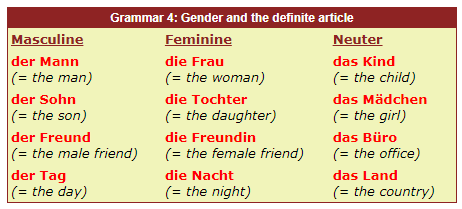Masculine, feminine and neuter
Bad news!We can put it off no longer. One of the major difficulties experienced by English speakers when learning German is that all German nouns, whether they represent persons, things or ideas have a grammatical gender. wheras in English gender virtually always corresponds logically to the sex of the noun, this is not the case in German. Most nouns denoting male persons and animals are in fact masculine, and most of those denoting females are feminine (examples of natural gender); but names of inanimate objects can be masculine, feminine or neuter.
Considering the nouns with which we have come into contact so far for example, a name is masculine in German (der Name), a city is feminine (die Stadt), wheras the word for a country is neuter (das Land). Overall, about 45% of German nouns are masculine, 35% are feminine and 20% are neuter.
Although there is no apparent rationale for this classification, guidelines for predicting genders do exist. Yet these rules are far from watertight - indeed there are exceptions to most of them. Against all natural logic, the word for a girl is neuter in German (das Mädchen)! The author Mark Twain famously complained about German nouns: "In German, a young lady has no sex, while a turnip has. Think what overwrought reverence that shows for the turnip, and what callous disrespect for the girl." The unpalatable truth is that whenever you learn a German noun, you have to learn its gender, just as Germans do.
The definite article
The best way to remember German genders is to learn each noun not as a single, isolated word, but together with the word for "the" that goes with it. We call "the" and its German equivalents the definite article, and unlike English nouns, the definite article in German is used to make the gender of German nouns obvious. Here are the genders of some of the nouns that we have met so far together with the appropriate form of the definite article:

Compound nouns
Many German nouns are a combination of two or more shorter words - we call them compound nouns. The gender is always that of the last element in the compound noun:

 英语
英语 日语
日语 韩语
韩语 法语
法语 西班牙语
西班牙语 意大利语
意大利语 阿拉伯语
阿拉伯语 葡萄牙语
葡萄牙语 越南语
越南语 俄语
俄语 芬兰语
芬兰语 泰语
泰语 丹麦语
丹麦语 对外汉语
对外汉语

